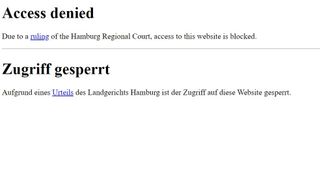YouTube-ripping site is finally going out after a court ban
A popular YouTube ripping site has finally been blocked for copyright infringement following a ban issued by a German court.
The youtube-dl takedown request was filed against German web hosting provider Uberspace in March and officially took effect on July 27. Torrent Freak reported. Despite GitHub being the platform on which the open-source YouTube downloader is hosted, Uberspace was held legally liable for being tied to the developer platform.
At the time of writing, the website is not loading and cannot even be accessed through a VPN service. Still, Uberspace said it is determined to continue the legal battle against the “devastating” order, which is believed to pave the way for more privatized censorship incidents.
youtube dl block
“I have no choice but to follow the verdict. Otherwise, I risk a $250,000 fine or jail time,” Uberspace owner Jonas Pasche told TorrentFreak, making sure the company was ready to fight back.
“We are convinced that a higher court will overturn the decision of the Hamburg Regional Court, so that we can unblock the site as soon as this happens.”
For now, users in and outside Germany who try to access the youtube-dl site will see a message like the image below:
But how did we get here? To better understand the events, we need to go back to 2020, when the RIAA released the removal notice to GitHub citing the Digital Millennium Copyright Act (DMCA) and alleged piracy.
The platform initially complied with such a request, only to restore the site and provide a strong legal defense with the help of experts such as Internet freedom advocates from the Electronic Frontier Foundation (EFF).
However, Sony, Warner and Universal were not about to give up their business. Then the RIAA turned its attention to German hosting provider Uberspace. Germany already had a history of taking a harder line against stream-ripping software that bypassed YouTube’s encryption download protection.
Uberspace’s arguments about the fact that youtube-dl has numerous legal use cases and the fact that YouTube’s chip protection can be circumvented using any common web browser were not enough to convince the Hamburg court.
“[T]he average user should recognize that YouTube content, unlike media content on other websites, cannot be downloaded with a simple right-click and should be aware that this is achieved using technology on YouTube and that youtube-dl ‘overrides’ this protection. It is therefore to be assumed that the average user is acting in bad faith,” is reading the Hamburg court order.
youtube-dl does not infringe or encourage copyrighted works, nor does it “circumvent” any technical protection measures on YouTube videos. But that hasn’t stopped the RIAA from looking for new ways to take it offline. https://t.co/vMGHQR4WQXMarch 4, 2022
For some time now, experts and courts have struggled with the difficulty of striking a balance between protecting internet freedoms and preventing copyright infringement.
For example, as streaming VPNs grow in popularity, the movie industry is pressuring providers to reveal users’ identities for alleged copyright infringements – exactly what a person wants to avoid by using a VPN.
From individual users, both the music and film industries are increasingly shifting their focus to providers. Still, experts argued that such legal action and injunction would ultimately curtail digital freedoms more broadly.
Speaking of the court ban in Hamburg in April, Pasche told TorrentFreakAs a result, hosting providers who receive complaints will most likely kick their customers out without a court order for things that could be perfectly legal.
“This is an embarrassing day for freedom of speech. It paves the way for privatized censorship. Do we really want this as a society? We are convinced that we are on the right side of history here.”


